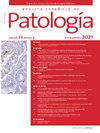Histopathological changes of nervous tissue in women over 60 years of age with Alzheimer's disease and their relationship with menopause
IF 0.5
Q4 Medicine
引用次数: 0
Abstract
Introduction
Ageing is a natural and irreversible process that primarily manifests in older age, becoming more common after the age of 60. Currently, a significant increase has been observed in the elderly population, with forecasts indicating that this group will triple in size over the next 50 years. This phenomenon is evident in several countries, including Japan, Mexico, Brazil, and Colombia, where the growing population of older adults is accompanied by an increased risk of neurodegenerative diseases, such as Alzheimer's disease. Studies have shown differences in the onset and progression of the disease between men and women, highlighting menopause and hormonal factors as key determinants in women. An association has been identified between a lower exposure to endogenous oestrogens and a higher risk of dementia in women, linked to the action of the enzyme β-secretase (BACE1), which is involved in the formation of amyloid aggregates associated with Alzheimer's disease. These findings highlight the importance of thoroughly investigating and understanding the impact of ageing and related diseases on the current and future population.
Objective
This study aims to describe the histopathological changes in nervous tissue in women over 60 years of age with Alzheimer's disease and their relationship to menopause.
Methodology
A comprehensive search was conducted in databases such as PubMed, ScienceDirect, Frontiers, Scopus, and Springer.
Results
Two hundred thirteen articles were selected for review and 45 full articles were chosen.
Conclusions
Alzheimer's disease is characterised by a progressive loss of cognitive function due to brain lesions, including the accumulation of amyloid-beta plaques and neuronal apoptosis. Hormonal changes during menopause may contribute to the onset of the disease.
60岁以上老年痴呆症患者神经组织的病理变化及其与绝经期的关系
衰老是一种自然的、不可逆转的过程,主要表现在老年阶段,在60岁以后更为普遍。目前,老年人口显著增加,预测表明,这一群体的规模将在未来50年增加两倍。这一现象在包括日本、墨西哥、巴西和哥伦比亚在内的几个国家很明显,在这些国家,老年人人口的增长伴随着阿尔茨海默病等神经退行性疾病的风险增加。研究表明,男性和女性在该病的发病和进展方面存在差异,并强调更年期和荷尔蒙因素是女性的关键决定因素。内源性雌激素暴露较低与女性痴呆风险较高之间存在关联,这与β分泌酶(BACE1)的作用有关,该酶参与与阿尔茨海默病相关的淀粉样蛋白聚集体的形成。这些发现强调了彻底调查和了解老龄化和相关疾病对当前和未来人口的影响的重要性。目的:探讨60岁以上老年痴呆症患者神经组织的病理变化及其与绝经期的关系。方法:在PubMed、ScienceDirect、Frontiers、Scopus和施普林格等数据库中进行了全面的搜索。结果:入选文献213篇,入选全文45篇。结论:阿尔茨海默病的特征是脑损伤导致认知功能的进行性丧失,包括淀粉样斑块的积累和神经元凋亡。绝经期荷尔蒙的变化可能导致疾病的发生。
本文章由计算机程序翻译,如有差异,请以英文原文为准。
求助全文
约1分钟内获得全文
求助全文
来源期刊

Revista Espanola de Patologia
Medicine-Pathology and Forensic Medicine
CiteScore
0.90
自引率
0.00%
发文量
53
审稿时长
34 days
 求助内容:
求助内容: 应助结果提醒方式:
应助结果提醒方式:


